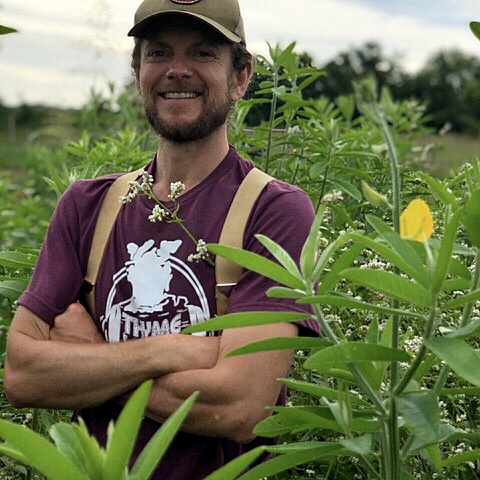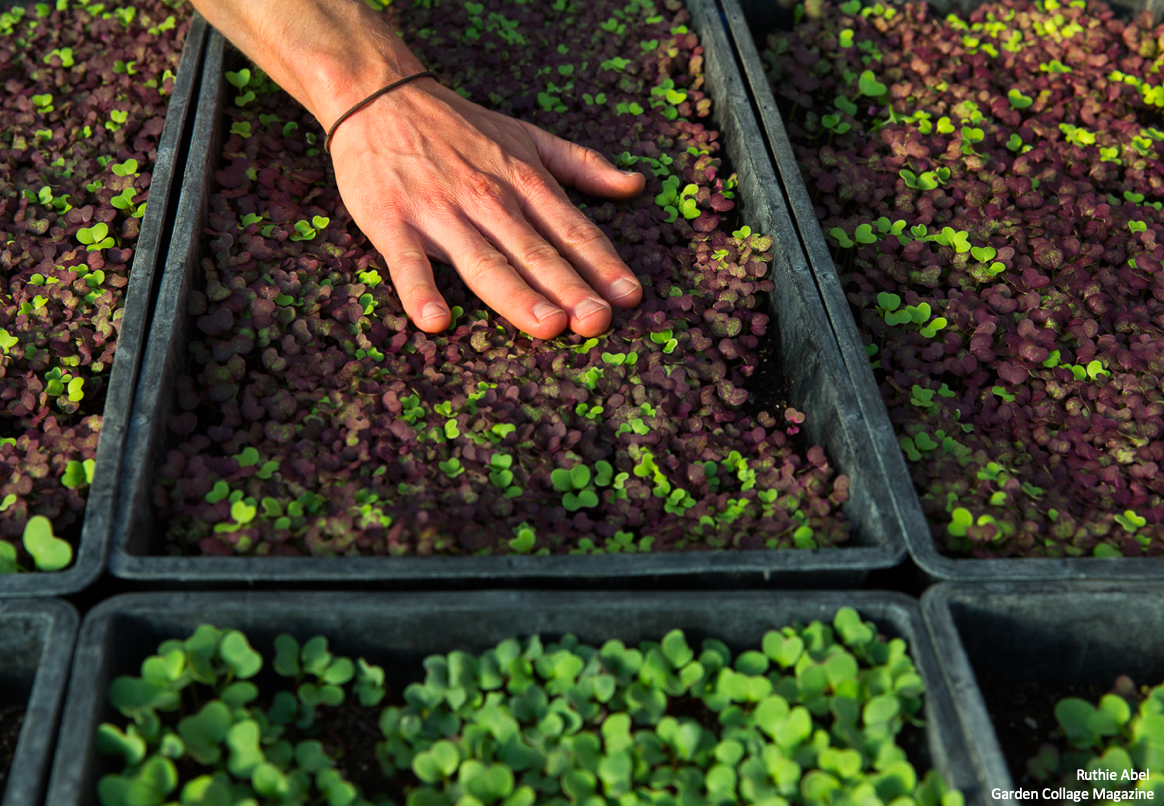
Zach Wolf is a true agriculture Renaissance man. From championing Biodynamic® agriculture to directing farm operations for the School of Social Change and serving as a Research Fellow at the Nature Institute — if it has to do with the land, he’s the person to talk to. He’s traveled across the United States working on thousands of acres of farmland. And he’s currently the Director of Farm Operations at Caney Fork Farms in Tennessee. But don’t let me give too much away, Zach Wolf answers our 18 Questions below!
1) Where are you from?
Northwest Connecticut, a small town called Salisbury, snuggled to the east of the Taconic Range and in the southern extent of Berkshire Mountains
2) Where are you based currently?
Carthage, Tennessee, about an hour east of Nashville, in the Central Basin just west of the Highland Rim
3) What sparked your interest in cattle grazing and haying to begin with?
Watching how much fun my farmer friends were having, the quality of life, the level of family connection and the wildness of it all
4) How did your time at Columbia University studying biology impact the way you view grazing and farming?
I was lucky to have fantastic teachers there that instilled concepts of systems thinking, biodiversity and ecosystem functioning and a broader understanding of how to measure and track ecological change. The farm is a living laboratory: experimentation and data collection happens naturally every day, so I feel prepared for my work in ways I did not originally intend but am grateful for now.
5) What are your current projects?
Caney Fork Farms, which is more than enough! We are building a model regenerative farm and conducting research all the way from the soil up; from the fungi associated with our tree roots to satellite imagery that can model the broader landscape-level change that could occur with more acres under this type of management. It is a dynamic place with a fantastic team.
6) Which of your jobs has made the most significant impact on how you view the environment and how?
Probably the internship I had at Aton Forest Ecological Research Station. It is not a well-known place, but the type of science pioneered there back in the 1930s has wisdom that we could all learn from today. It was lowcost, long-term and fundamentally human — meaning good observation was key to doing good science. Almost 20 years later, I have a great teacher at the Nature Institute that has furthered my own relationship to science and what it means to pay close attention. I don’t think we can farm well without truly working to see all that is around us. Every moment is an opportunity to learn more and inform us to make our farming closer to becoming what already is and wants to become.
7) You’ve worked across the USA on thousands of acres of different farms. Is there a difference in the way people talk about climate change and agriculture in different areas?
Hot button question! Certainly here in the Southeast it is a different conversation than the Northeast, where I have done much of my work. Generally, we try to lead by example and talk about what is undeniably real around us. Our farming works under climate extremes (drought, flood, etc.) so we can let the health of the land speak for itself. The changes in weather are so extreme, and those with a memory of the land, regardless of how they think of humanity and climate change, see this too. So I would say I am more careful not to politicize the issue and bring it back to reality and back to what is proving itself to work in this new world we farm in.
8) What does conservation agriculture mean to you? Does it differ from regenerative agriculture?
Well, I don’t like to get too caught up in terms. I think conservation agriculture (con ag) is a powerful way to express the inextricable relationship between all life on a landscape. The con ag process is very specific in my mind: it starts with a scientific understanding of the ecology of a place and builds a farm around that ecology. Continued science and monitoring and farming systems adaptation are also central to making this thing work overtime. I think the term regenerative is still being defined. I know the good work at Rodale with ROC recognizes the importance of wildlife habitat. This has also been a part of biodynamics since the beginning, almost 100 years ago. But I think as we move forward, more rigorous incorporation of con ag principles would only strengthen how we think about, define and eventually label and regulate “regenerative agriculture.”
9) Who are your inspirations?
My parents, with their persistent humor and patience. Allen and Robin at Whippoorwill, with the graceful way they have lived as farmers. And all the folks, mostly younger than I, that I have worked with over the years that are coming to farming for the first time and stick with it, have humility and pride all at the same time and work really hard.
10) What is your work like with the School of Social Change?
New and emerging. I am speaking at an upcoming event this fall. I look forward to it and have great respect for their work.
11) This past Monday was Cow Appreciation Day. Why are cows so important?
They do something really important we can not: digest grass. On much of this world’s surface, grazing the land is the most efficient, sustainable, regenerative, organic (pick a term) way to produce meat, milk, and fiber. Cows and ruminants, in general, give us so so much all the while helping us build soil and, in many instances, sequester carbon. Something magical happens in a rumen that enriches and inoculates the earth with an entirely different diversity of life. They are indispensable in my mind for so many farms to properly cycle fertility and stay productive over time. They do not fit in all contexts but they do in many. And they may not fit in all diets but they do in many. It is not an ‘either-or’, it is a ‘yes and’.
12) If you could get the world to understand one thing about cows’ role in the farming ecosystem, what would it be?
Everything I just said.
13) Are you a vegetarian or vegan?
I am not. I am a conscious carnivore. I understand this might sound like a contradiction to some. After trying different diets and being on many farms, animals make sense to me. Eating meat is clearly a deeply personal choice and one that everyone needs to make for themselves. I am grateful for these beings and see them as an integral part of my health and the health of our farm.
14) What does “[Community Supported Agriculture] CSA’s standards of living a natural life on nutrient-dense forage that prevents the need for antibiotics, chemical dewormers, or growth hormones” mean to an eco-friendly consumer?
This is referring to how we raise our animals. During their lives, they have the best conditions to thrive as we can provide and are never mistreated. It means that we have good soil which means good forages for the animals to eat which means the quality of meat (and nutrient profile) is exceptional. Really. It also means that as an eater, you can be assured that some of the harmful byproducts of industrial meat production (like antibiotics, growth hormones and dewormers) will not be in the food itself. It is clean. It is an unfortunate reality, but this is not necessarily the standard now for Americans today.
15) What are your fears with regards to green-washing (false labeling of products to make consumers feel like they are buying eco-friendly and organic when they are not), if you have any at all?
Yeah, I do! It is happening now, every day. I think we are at an exciting and important moment to evolve the food and farming movement. Given the way food is distributed in this country, and how disassociated most eaters are from a direct relationship with a farm (which would be my ideal), labeling and language are hugely important right now. We need to look towards those that have been leading with integrity for many years, like those that pioneered organics back in the day and to organizations like Demeter (that certifies Biodynamic® agriculture) that have kept their vision and integrity. Stay posted, as these years are proving critical for the future of organic as a label. Moreover, as regenerative continue to emerge as a term, the community needs to build an even higher standard that will both maintain principles and provide pathways of adoption for those working to transition from chemical ag.
16) What does social change in agriculture mean to you?
It means that for agriculture to thrive we need to not forget the culture of agri-culture. It is really such a big question to address. But I believe all facets of our culture will need to evolve to allow for a truly healthy food system to emerge. But at the most fundamental level, a better understanding and respect for the work involved in good farming would go a long way. I think that we have a huge opportunity in rural America to reimagine the potential of agriculture to build social equity and economic prosperity, rather than break it down. But for any of that to take place we need a food system that: values farmworker rights, accounts of the associated costs and benefits of agriculture (on both ends of the spectrum — from agricultural pollution to ecosystem services), and identifies healthy soil as something to be protected, as we do (or strive to) with the clean water and clean air acts.
17) What is the most difficult part of your work?
Communication. It is something I have worked on throughout my career and still have more to go. Generally, it feels like deeper listening is something we all could get better and that would help our collaborations. But this extends beyond our immediate farm team and circle of researchers and into the broader world where both storytelling and story-listening are so important. How we talk about the work we do and connect to the work already underway around us (even if we do not understand or agree with that work) – that translation is central to our success and viability. We need to learn how to tell our story and connect with those right in our backyards.
18) What responsibility do you think farmers (or the general populace) have towards investing in sustainable farming practices?
I think we all have, not just a responsibility, but a deep investment for our own betterment and wellbeing, for true stewardship. It is just that simple. Our future and our personal health are dependent on how we treat our land and more specifically our soil.
Thank you, Zach, for sharing with us! Check out Zach’s work and the Caney Fork Farms staff on their website.
Header Image: Ruthie Abel via Garden Collage Magazine
 Food
Food Farmers
Farmers Sustainable Living
Sustainable Living Living Planet
Living Planet News
News